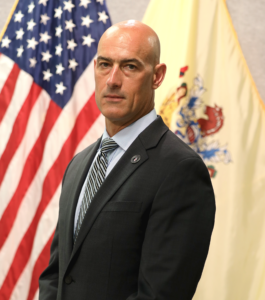In war on disinformation, a dubious crusader joins the fight — the government
In the early days of the pandemic, when conspiracy theorists were ranting about things like the government injecting trackable microchips into people via vaccine, New Jersey launched a disinformation portal to counter the craziness.
In the two years since, the portal — run by the state’s Office of Homeland Security and Preparedness — has put out warnings on everything from deepfake technology to the war in Ukraine to, most recently, monkeypox. Just a handful of other states, including Colorado, California, and Connecticut, have launched state-run websites intended to dispel disinformation on elections, COVID-19, and other issues.
But is government — one of the most distrusted entities around — the best resource for debunking disinformation?

One expert says no. Britt Paris, assistant professor of library and information science at Rutgers University, said such state-run disinformation portals are unusual — for a reason.
“In many cases, people are right to mistrust state governments, given their history of oppression through policy, corruption, and cover-ups for corporate malfeasance,” Paris said. “You need only think about state-sanctioned police brutality and the release of toxins into predominantly minoritized and disenfranchised communities, both here in New Jersey and across the country.”
She added: “Because of this history, state-based initiatives are seen as questionable, regardless of where one falls on the ideological spectrum, and are easy targets for sowing distrust around their goals, even if they offer reputable information.”
That happened last spring, when a federal disinformation-busting initiative by the Department of Homeland Security fell victim to public mistrust and ended just a month after it started.
In New Jersey, Thomas Hauck acknowledged the hurdle the government faces in gaining the public’s trust. Hauck, a retired FBI agent and U.S. Marine, last month took over New Jersey’s Office of Homeland Security and Preparedness’ intelligence and operations division, where the disinformation portal is based.
But New Jersey’s portal is just “one piece of the puzzle” in the battle for truth, Hauck said. Providing accurate information will help build public trust, he added.
“The reality is there’s no one platform or agency that has the manpower or the means to track and dispel the amount of disinformation being circulated,” Hauck said. “We are making an effort to get reliable information into the hands of citizens.”
Eventually the public will see that the information that’s been coming out of his office is accurate, he added.

The portal, which offers users a “checklist” to determine if something is disinformation, has logged nearly 300,000 visitors since it launched in March 2020, Hauck said.
With so much misinformation, Hauck said his office weighs several factors when picking what to post on the portal.
They highlight trends “that have the potential to incite panic and create distrust between the government and the people, as well as disinformation trends that have the potential to increase polarization, influence government actions or law enforcement responses, and exhaust resources and bring about undue harm.”
Monkeypox disinformation — the office’s most recent alert — falls under several of those categories, especially because it could derail efforts to stop its spread, he added.
The portal warns readers about viral videos and homophobic claims on social media that contain misinformation and contribute to the stigma around monkeypox. Such disinformation could discourage infected people from getting treatment, hampering efforts to curb the outbreak, statements on the portal say.
Paris agreed public health misinformation is important for states to address. But political and economic concerns undergird a lot of the distrust in governments, including public health matters, Paris said.
For example, information and health care systems have become so “corporatized” that the public has become suspicious of their messaging, she said.
And, she added, “most topics are injected with ideological conflict these days, even and especially when it makes no sense.”
That’s why the state might be better served by enlisting locally situated, trusted sources of information — like community-based media and podcasts, churches, universities, and social organizations — in disinformation missions, Paris said.
States also could reinvest in public libraries, public schools, and public media instead of top-down disinformation portals, she added.
“There is no one-size-fits-all, magic-bullet approach,” she said. “But paying attention to who people trust is key.”
GET THE MORNING HEADLINES DELIVERED TO YOUR INBOX


